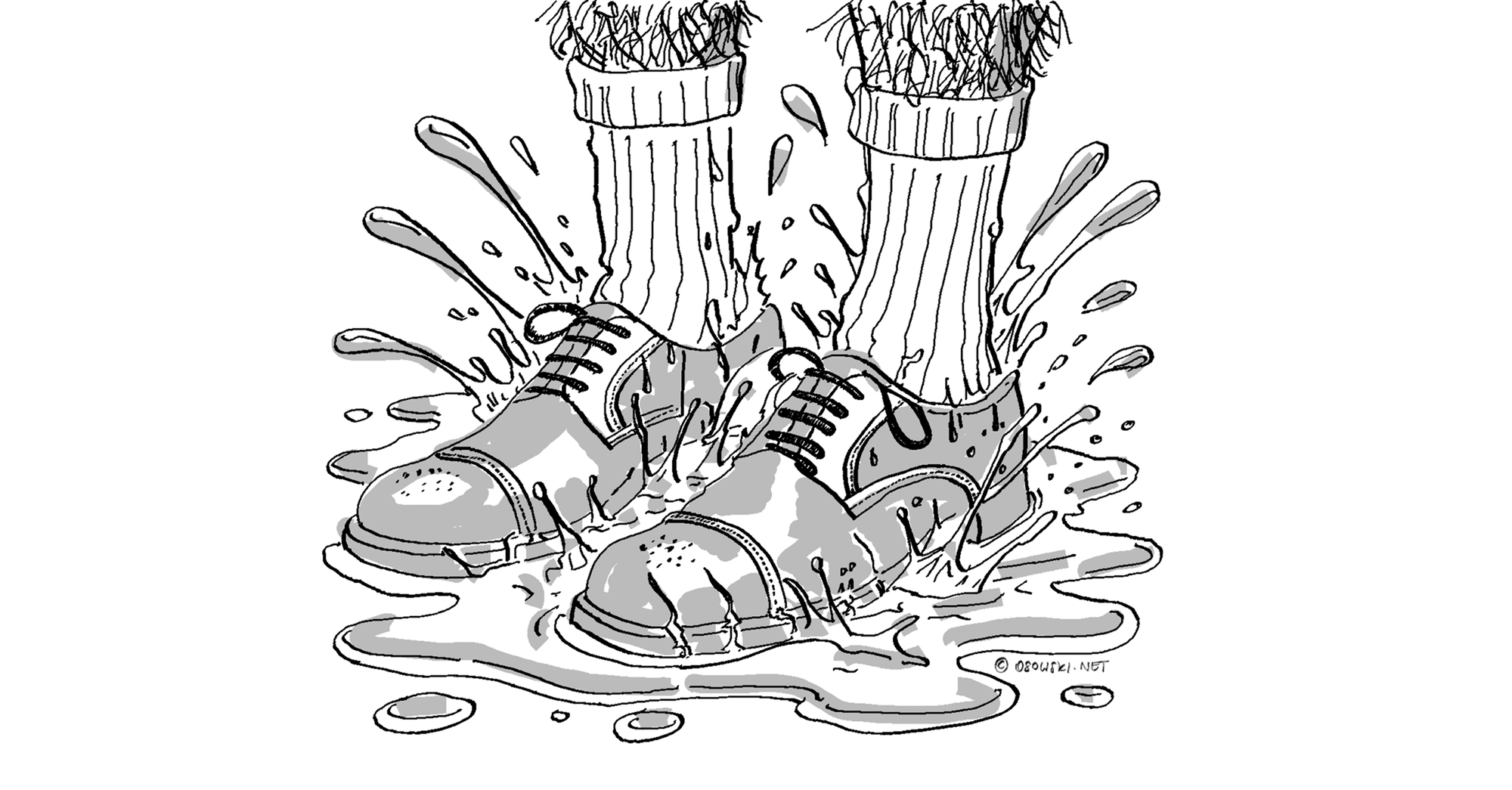If you go for the easiest option today, it will most likely come back to bite you tomorrow. Here’s a nasty military metaphor that always drags me back from the path of least resistance.
Despite being relatively young, the hardest part of my job – especially in meetings – has always been trying not to piss in my boots. Not in mine, not in my teammates’, not in the owners’, not in the company’s.
Shocking? Well, it gets easier to picture once you know that “pissing in one’s boots” is just a disgusting metaphor born from military mockery of easy, short-sighted decisions: “when a soldier’s feet are freezing, he can always piss in his boots; sure, his feet will get wet, freeze solid, and in the end someone will have to cut them off – but hey, he was warm for five minutes!”
In this week’s Memo, you’ll read about how I try – and what it costs me – to make sure what we build makes it to the finish line on its own feet.
A Total Lack of Self-Preservation Instinct
Smiling politely, our CEO sent my team on their way and asked me to stay behind. He pointed me toward the smallest conference room and closed the door behind us. The air still smelled like sweat – a clear indication that, lately, the company had been wringing people dry.
Silence fell. He remained standing, so I didn’t sit either. Still looking for the right words, he stared at the tips of his immaculately polished shoes. The sweaty air was slowly giving way to a choking wall of his cologne. After what felt like an eternity, he lifted his head, leaned both hands on the table between us, looked me straight in the face, and spat out: “Do you have any self-preservation instinct at all!?”
For those unfamiliar with zoology: this was the CEO’s way of reminding me that, in corporate terms, I was prey. A twenty-something line manager with a mortgage on his back, disposable at thirty days' notice. I was supposed to be scared.
“Don’t you understand that when you and I are in the same room, you’re in no position whatsoever to be right about anything!?” ❶ he said, referring to how I’d handled myself in the meeting that had just ended.
Throughout that very meeting, our CEO had been trying to force specific UX changes ❷ to the product onto one team member after another. And throughout that very meeting – with a few exceptions – I had to push back, challenge his reasoning, and reassure the team that we were sticking to the original plan.
Apparently, from his perspective, I’d chosen to risk my career rather than back decisions that – honestly, and even now – I believed were wrong.
I was about to find out at what cost.
How Not to Piss in Your Boots
Do you think I enjoyed it? That I wouldn’t rather have been the management’s favorite? That it never occurred to me to just shut up and keep good relations at the expense of results? Or to stay quiet and let my team choose on their own between our stance and the CEO’s? Or maybe I’m simply rich enough and into BDSM? The answer is far more mundane: it comes down to what psychology calls delayed gratification.
So no, there’s nothing wrong with my self-preservation instinct. It’s just that after years in product management – unlike fruit flies, moths, or managers hopelessly clinging to their positions – mine now works on a timeline longer than “until the next paycheck.” What scares me most these days are horror stories where the real monster only shows up after 6 to 18 months. That’s exactly when we’d have to face the consequences of me yielding to the CEO.
Having seen products – and entire businesses – slip off course on rotten compromises, I’ve grown far less tolerant of them. I’ll write more about how our natural urge to be polite drags meetings toward suboptimal outcomes in “Apply Pressure” (coming soon). But not pissing in your boots is something more.
It’s holding the course under direct threat.
It’s acting against yourself, when your whole body tells you it’s easier to just smile like an idiot and follow the crowd.

A Simple Test
Avoiding an instinctive reaction to a stressor is unnatural. It requires self-awareness and control. According to the APA Dictionary of Psychology, the self-preservation instinct is a fundamental drive in humans and animals to engage in behaviors that help avoid injury and maximize the chance of survival. ❸ The dictionary also tells us that an instinctive reaction is one that is automatic, inborn, does not require learning – in other words, it’s immediate and involuntary. ❹
So don’t be mad at yourself if, after reading this, you realize that in some situation you couldn’t quite hold your bladder. To avoid guilt (and possible limb loss), my brain is almost constantly scanning office reality using a simple set of questions:
- Is the situation stressful?
Is the stake high? Are interests in conflict? Can you sense the tension? If yes, move on to the next question. - Will I gain an emotional benefit if I act in a certain way?
Is there an easier choice? Is one option less painful? Will one of the possible reactions spare me discomfort, like admitting failure or straining a relationship? If yes, move on to the next question. - Could the easier choice have negative consequences for me, the project, the product, the organization?
Without sugarcoating – does the easier option stand a chance of being as productive as the alternatives? Are there strong arguments in its favor, apart from those tied to its emotional upside? Have the harder choices been rationally ruled out? If not – don’t take the easy way out. Make sure you’re not fooling yourself into pissing in your boots.
Every time you (consciously or not) picked the easiest option – I don’t feel sorry for you. Every time you put emotional comfort ahead of functional outcomes – you're asking for an amputation. And yes, I hear you: “I’ve got two kids in college, a mortgage, and I really like authentic Italian food. I can’t play the hard-headed rebel.” Fine. But let’s not kid ourselves that you’re doing it for performance. Your success lies in job security, day-to-day comfort, and pleasant workplace relations. Now go ahead – celebrate with another meatball.
Moments that Matter
Why does not pissing in your boots matter? Can’t you just, once in a while, pat your coworkers on the back? Swallow an “enlightened” idea from leadership that’s never even seen your app’s users in a photo? The problem is that in a surprisingly large number of cases – especially as managers – what we do at work sets standards. The standard of following the crowd. The standard of nodding along with the CEO. The standard of committing to delivery without proper refinement.
My colleague Karol, tech lead of one of the best teams I’ve ever worked with, once told me that when we first started collaborating, he thought I was aggressive. Only later – as he put it – he realized that I was simply setting clear boundaries from the start. I did it then, and I still do it now, because I believe very little that happens at work is free of long-term consequences.
And once boundaries are crossed, it’s very hard to restore them. If you show your team that changes can be made to the product without research, that position in the company can outweigh data, don’t be surprised when your product drifts away from user needs. At the same time, once you participate even once in a harmful practice, it becomes hard to stop it – doing so can make you seem inconsistent, or even hypocritical.
That’s why it’s better – whenever possible – not to piss in your boots.
The Most Pissed-in Boots in the World
For me, the main form of not pissing in your boots is avoiding technical debt. According to Ward Cunningham, technical debt is a metaphor for the future cost of work that results from choosing faster but less optimal technology solutions today. ❺ The concept was described long ago, in 1992 ❻ – and yet most organizations I know are drowning in it.
If that’s also the case in the company you’re working at now, then in the name of quick business gains your organization is most likely pissing in its boots on a daily basis.
I sincerely hope that while reading this, at least one situation came to mind when you ended up pissing in your boots. That’s completely natural. What matters is to reflect on why it happened, what emotions came with it, and then decide whether you prefer performance or meatballs. Both options have their pros and cons. Let me know what are your thoughts in the comments.
Sources & side notes
① Both quotes in this conversation are verbatim. Those things kind of stick with you.
② “User experience (UX) encompasses all aspects of the end-user's interaction with the company, its services, and its products.” – Norman, D., & Nielsen, J. (1998). The Definition of User Experience (UX). Source: Nielsen Norman Group
③ “Self-preservation instinct – the fundamental tendency of humans and animals to behave in ways that avoid injury and maximize survival.” – APA Dictionary of Psychology. Source: APA Dictionary of Psychology
④ “An automatic instinctive unlearned reaction to a stimulus.” – Vocabulary.com for “reflex.” Source: Vocabulary.com
⑤ Imagine you want to hang a mirror. To save time, instead of using two screws as per design, you hang it on one screw and a string stretched between two hinges on the back. That mirror won’t stay straight for long. Later, someone will have to take it down, cut the string, remove the central screw, install two new screws, patch the old hole and hang it again – or the mirror will fall. That’s what technical debt is.
⑥ “Technical debt is a metaphor referring to the eventual consequences of poor system design, software architecture, or software development within a codebase. If the debt is not repaid, it can accumulate ‘interest,’ making future changes more costly and difficult.” – Cunningham, W. (1992). The WyCash portfolio management system. OOPSLA ’92 Experience Report. Source: ACM Digital Library
